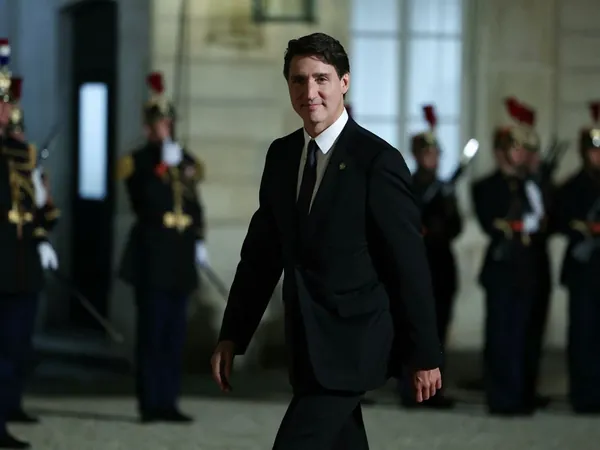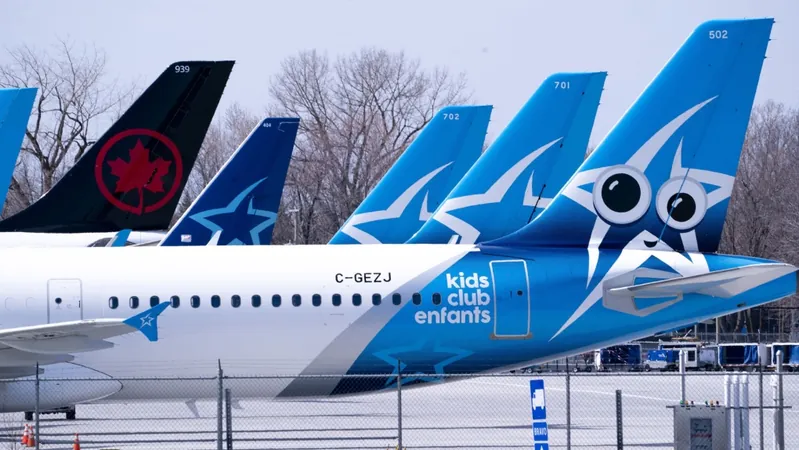
Trudeau’s Desperate Maneuver: Is Canada on the Brink of Another Constitutional Crisis?
2024-10-07
Author: Benjamin
Introduction
As Prime Minister Justin Trudeau’s leadership teeters, Canada appears to be heading toward an existential crisis. With his support from the New Democratic Party (NDP) recently evaporating, Trudeau’s commitment to maintaining his grip on power is driving him closer to the separatist Bloc Québécois, led by Yves-François Blanchet.
Trudeau's Promises and Current Alliances
Trudeau's 2015 promise to improve the welfare of Canadians, from free prescriptions to better dental care, is now overshadowed by his desperate search for allies. After NDP Leader Jagmeet Singh ended their support agreement, Trudeau is now courting the Bloc in an attempt to stay afloat. The Bloc has presented a list of demands that includes critical protections for supply management and increased pension benefits, setting a tight deadline of October 29 for negotiations. Failure to meet these demands could precipitate a federal election—one that would likely spell disaster for Trudeau.
Concerns About Separatist Influence
Alberta Premier Danielle Smith expressed alarm over what she perceives as a growing Liberal-Bloc alliance, stating, 'Canada cannot be held hostage by the whims of Quebec separatists.' This sentiment reverberates across the country as many Canadians are concerned about the implications of a government influenced heavily by a separatist party.
The Stakes of Supply Management
The stakes are high, especially regarding Canada's contentious supply management system which disproportionately benefits Quebec’s dairy farmers. Critics argue that this system not only burdens consumers with higher prices but also alienates key trading partners, particularly the United States, as Canada prepares for critical trade negotiations. With farmers in influential states like New York and California watching closely, any move to strengthen Quebec's foothold in federal decisions could jeopardize existing trade agreements, including the Canada-United States-Mexico Agreement (CUSMA), which is up for review in 2026.
Economic Implications
Trudeau’s supporters within the agricultural sector fear that his willingness to appease separatists by supporting Bill C-282—which would secure supply management against trade negotiations—could invite severe economic repercussions and stymie Canadian exports, much to the dismay of organizations like the Canadian Agri-Food Trade Alliance (CAFTA).
Warnings from Experts
Former Liberal cabinet minister John Manley articulated the broader economic dangers, suggesting that Canada’s trajectory under Trudeau’s leadership is not sustainable. Politically cornered and deeply unpopular, Trudeau is now at the mercy of a party that prioritizes the interests of Quebec over national unity, raising alarms about the potential for instability in the nation.
Conclusion
The sentiment among many Canadians is clear: Trudeau's current strategy could risk more than just his political career; it threatens the very fabric of national unity. In an already fractured political landscape, the question remains—will Trudeau’s compromises lead Canada into a new crisis, or will he find a way to stabilize his government without succumbing to separatist pressures? As this drama unfolds, the eyes of the nation remain fixated on Ottawa.









 Brasil (PT)
Brasil (PT)
 Canada (EN)
Canada (EN)
 Chile (ES)
Chile (ES)
 España (ES)
España (ES)
 France (FR)
France (FR)
 Hong Kong (EN)
Hong Kong (EN)
 Italia (IT)
Italia (IT)
 日本 (JA)
日本 (JA)
 Magyarország (HU)
Magyarország (HU)
 Norge (NO)
Norge (NO)
 Polska (PL)
Polska (PL)
 Schweiz (DE)
Schweiz (DE)
 Singapore (EN)
Singapore (EN)
 Sverige (SV)
Sverige (SV)
 Suomi (FI)
Suomi (FI)
 Türkiye (TR)
Türkiye (TR)